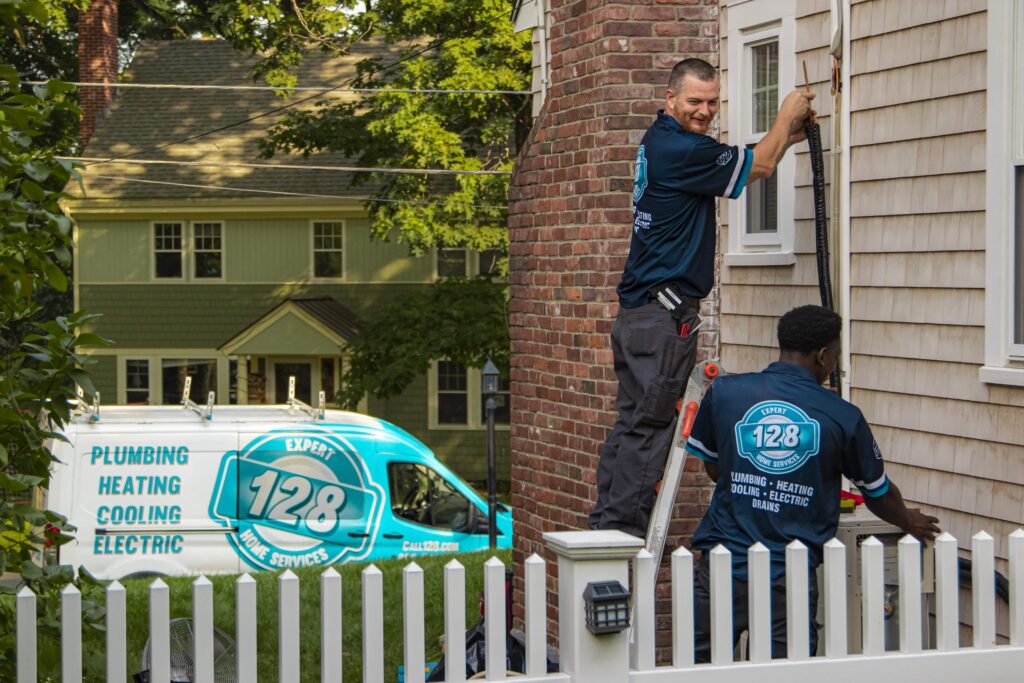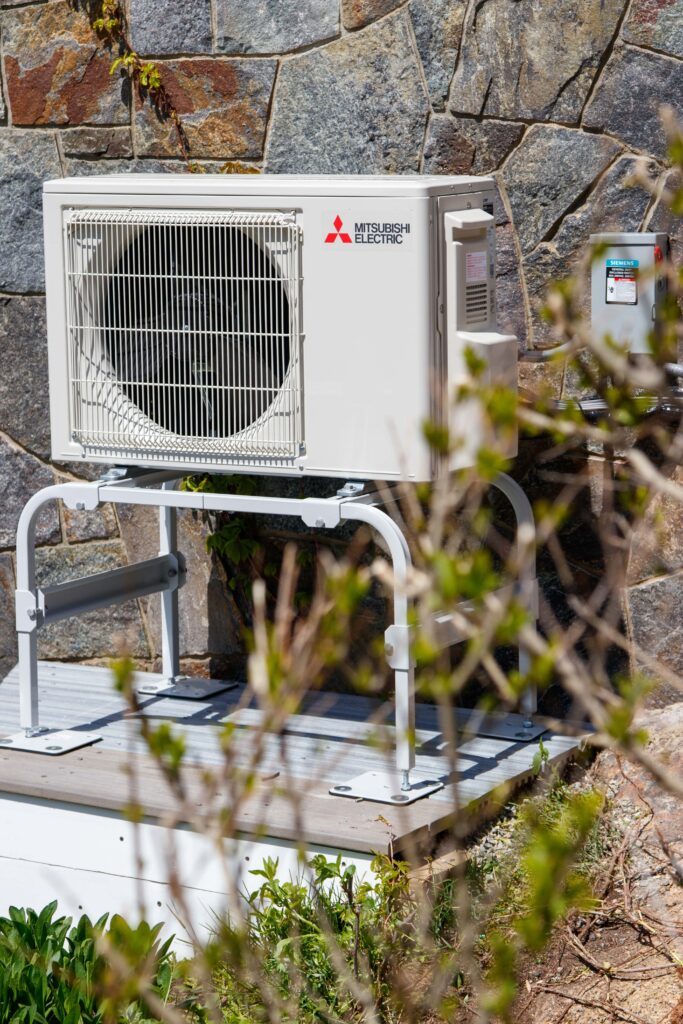
As the world becomes increasingly aware of the need to save energy and reduce carbon emissions, the importance of electric heat efficiency cannot be understated. At 128 Plumbing, Heating, Cooling, and Electric we believe that if you’re considering an electric heating system for your home, having an understanding of electric heat efficiency and its role in reducing energy consumption and costs is essential. In this blog post, we will delve into various electric heating systems, compare their efficiency to gas heating, and provide tips for maximizing the efficiency of the system that’s right for you.
Key Takeaways
- Understand electric heat efficiency to maximize energy savings in the home
- Choose the right system and utilize off-peak rates for lower operating costs
- Perform regular maintenance & upgrades to maintain peak efficiency, reduce energy consumption, and extend system lifespan
Understanding Electric Heat Efficiency

Electric heat efficiency refers to the measure of how effectively heat energy is used to produce a specific amount of electric heat. Grasping this concept aids in limiting energy consumption and the costs attached to it.
Electric heating systems, such as electric heaters, space heaters, electric resistance heaters, and heat pumps, are highly efficient in converting electrical energy into heat, leading to energy savings and improved comfort in your home.
What is electric heat efficiency?
The term ‘electric heat efficiency’ represents the proportion of useful heat output to energy input – less energy is wasted when efficiency is higher. Electric heating systems such as electric furnaces, electric resistance heaters, and heat pumps are available, each with their own advantages and disadvantages.
Insulation and home sealing, temperature control systems, and regular maintenance and upkeep all contribute to electric heating efficiency. Enhancing insulation and sealing can help decrease energy expenditure, while temperature control systems can assist with maintaining a consistent temperature in the home.
Why is energy efficiency important?
Energy efficiency plays a key role in lowering energy bills, reducing environmental impact, and guaranteeing peak performance from heating systems. Electric heating systems, such as electric furnaces, electric resistance heaters, and heat pumps, are designed to be energy efficient, helping homeowners save money on their energy bills while also reducing their environmental footprint.
Types of Electric Heating Systems
There are various electric heating systems available, each with its own set of benefits and drawbacks. The three main types of electric heating systems include electric furnaces, electric resistance heaters, and heat pumps. Detailed exploration of these systems’ efficiency, installation, and running costs will be covered in the upcoming sections.
Electric Furnaces
Electric furnaces use ducts to distribute heated air throughout the home, but may have higher operating costs due to duct heat losses. These furnaces are equipped with a series of three to seven electric resistance coils, known as elements, each rated at five kilowatts. To prevent overloading the home’s electrical system, the furnace’s heating elements activate in stages.
The efficiency rate of an electric furnace is 100%. However, in certain climates, gas furnaces can be more efficient than electric furnaces.
Electric Resistance Heaters
Electric resistance heaters, which provide zonal heating through electric resistance heat, include baseboard, wall, and radiant heaters, but may not be as efficient as other options. These heaters work by converting electrical energy into heat through a wire or coil heating element, a process known as electric resistance heating. Electric resistance heaters are regulated by a thermostat and are typically located beneath windows.
Prevent warm air from passing behind the baseboard heater by fitting it tightly to the wall. This also stops dust particles from streaking the wall. Install baseboard heaters at least three-quarters of an inch (1.9 centimeters) above the floor or carpet for optimal results.
Heat Pumps
Heat pumps, such as air-source, water-source, and ground-source, are highly efficient electric heating systems that transfer heat from external sources into the home. These systems, including ground source heat pumps, are known for their efficiency and effectiveness in heating living spaces, as they collect heat from the outdoors and transfer it into living spaces. Heat pumps demonstrate nearly triple the efficiency of baseboard heaters and can provide a maximum of 10,000 or more BTU/kWh.
Factors Affecting Electric Heating Efficiency
Regardless of the electric heating system you employ, a few components can affect its overall efficiency (including your heat pump). These components include insulation, temperature control systems, and regular maintenance.
Subsequent sections will delve into each of these influencing factors on the efficiency of your electric heating system.
Insulation and Home Sealing
Proper insulation and sealing of a home can significantly improve electric heating efficiency by reducing heat loss. Insulation assists in preserving the heat within a home, which in turn can decrease the amount of energy needed for heating. Additionally, appropriate insulation can help reduce energy waste due to air leakage.
Home sealing, such as sealing air leaks and gaps in walls or floors, further bolsters the insulation by preventing cold air from entering and warm air from escaping. To effectively insulate and seal a home, it is crucial to check for air leaks around windows and doors, seal any gaps or cracks in walls or floors, and add insulation to attics, basements, and crawl spaces.
Temperature Control Systems
Temperature control systems, such as smart thermostats, can help optimize electric heating efficiency by:
- Adjusting settings based on occupancy and usage patterns
- Maintaining a consistent and ideal temperature
- Allowing the heating system to work at peak efficiency
- Facilitating energy savings and reduced operating costs.
Temperature control systems:
- Monitor the temperature of a space
- Adjust the heating system accordingly to maintain a desired temperature
- Adjust the temperature based on occupancy and usage patterns.
Maintenance and Upkeep
Ensuring regular maintenance and timely upgrades to your electric heating system can maintain its peak efficiency, thereby reducing energy consumption and costs. Here are some necessary maintenance and upkeep tasks for electric heating systems.
- Regular inspections
- Cleaning and replacing air filters
- Checking and replacing heating elements
- Inspecting for any signs of wear and tear
By performing these tasks, you can keep your electric heating system running smoothly and efficiently.
Timely execution of regular maintenance and upgrades ensures:
- Optimal performance and efficiency of electric heating systems
- Reduced energy costs
- Extended system lifespan
- Consistent comfort and performance
If you’re interested in a heating maintenance program, contact one of our experts today!
Electric Heating vs. Gas Heating: Efficiency Comparison
This section will draw a comparison between electric and gas heating, focusing on:
- Efficiency
- Energy costs
- Environmental impact
- Future trends
While gas heating may have lower energy costs per unit, electric heating systems can be more efficient, leading to lower overall energy consumption.
Furthermore, electric heating systems have the potential for lower environmental impact, especially when powered by renewable energy sources.
Energy Costs
While gas heating may have lower energy costs per unit, electric heating systems can be more efficient, leading to lower overall energy consumption. The difference in energy costs between electric heating and gas heating can vary depending on factors such as location and energy prices.
Environmental Impact
Electric heating systems have the potential for lower environmental impact, especially when powered by renewable energy sources. The combustion of gas to produce heat leads to the emission of carbon dioxide (CO2) into the atmosphere, making heating the primary contributor of CO2 from the majority of households.
The environmental impact of electric heating and gas heating can vary depending on the source of electricity and the efficiency of the systems. Electric heating has the potential to reduce greenhouse gas emissions if the power source is clean.
Future Trends
As the focus on reducing greenhouse gas emissions increases, electric heating systems, particularly heat pumps, are expected to become more prevalent in the future. The adoption of heat pumps powered by low-emissions electricity and the electrification of heating systems are expected to be key trends in electric heating in the near future.
It is anticipated that gas heating will decrease as the transition to renewable energy sources and less carbon-intensive natural gas progresses.
Tips for Maximizing Electric Heating Efficiency
This concluding section will provide tips to maximize the efficiency of electric heating systems. Choosing the right system, taking advantage of off-peak rates, and performing regular maintenance can all help to ensure that your electric heating system operates at peak efficiency, reducing energy consumption and costs.
Choosing the Right System
Selecting the most suitable electric heating system for your home and climate can significantly improve efficiency and reduce energy costs. It is important to consider the advantages and disadvantages of each system before making a decision. By partnering with 128, you’ll have a trusted ally who will guide you through this process to make sure you’re deciding on a heating system that will work best in your home and suit all your unique needs and specifications.
Electric furnaces, electric resistance heaters, and heat pumps are all types of electric heating systems that are available, each with their own set of benefits and drawbacks. Proper insulation and sealing can also improve the efficiency of your chosen system.
Taking Advantage of Off-Peak Rates
Utilizing off-peak electricity rates, where available, can help lower the operating costs of electric heating systems. Off-peak electricity rates are lower electricity rates which are available at certain times of the day or week. These rates are usually lower than the standard electricity rates and can help minimize the operating costs of electric heating systems.
Some strategies for utilizing off-peak rates include:
- Setting the thermostat to a lower temperature during off-peak hours
- Using a timer to turn off the electric heating system during off-peak hours
- Programming a thermostat to adjust the temperature during off-peak hours
Regular Maintenance and Upgrades
Ensuring regular maintenance and timely upgrades to your electric heating system can maintain its peak efficiency, thereby reducing energy consumption and costs. Here are some necessary maintenance and upkeep tasks for electric heating systems.
- Regular inspections
- Cleaning and replacing air filters
- Checking and replacing heating elements
- Inspecting for any signs of wear and tear
By performing these tasks, you can keep your electric heating system running smoothly and efficiently.
Timely execution of regular maintenance and upgrades ensures:
- Optimal performance and efficiency of electric heating systems
- Reduced energy costs
- Extended system lifespan
- Consistent comfort and performance
Why 128 for Efficient Heating Solutions

In today’s current world, it’s hard to talk about heating solutions without discussing high-efficiency electric heating systems. Electric heat efficiency is an essential aspect of reducing energy consumption, costs, and environmental impact. By understanding the different types of electric heating systems, such as electric furnaces, resistance heaters, and heat pumps, and the factors that can affect their efficiency, you can make informed decisions about your home’s heating system. That’s ultimately the goal of 128 Plumbing, Heating, Cooling, and Electric, that you make the best choice possible for the most efficient heating system for your home.
Our commitment to sustainability means your heating system will not only be effective but eco-friendly. As our world continues to prioritize energy efficiency and reducing carbon emissions, electric heating systems offer a promising solution for the future. If you’re looking for efficient electric heating solutions, call or text us today
Frequently Asked Questions
Is electric heat 100% efficient?
Electric heat is 100% efficient, meaning that all the energy that goes into it is converted to heat.
However, when looking at overall energy production efficiency, electricity produced from coal, gas, or oil generators only converts about 30% of the fuel’s energy into electricity.
Is it cheaper to heat with gas or electric?
On average, natural gas is cheaper than electric heat in the US, costing about 75% of the price of electric heat over a year for a home.
This makes natural gas an attractive option for many homeowners looking to save money on their heating bills.
What are the main types of electric heating systems?
Electric furnaces, electric resistance heaters, and heat pumps are the main types of electric heating systems, providing homeowners with reliable heating options.
These systems are energy efficient, cost-effective, and easy to install and maintain. They are also safe to use and can be used to heat a variety of spaces, from small apartments to large homes.
How can I improve the efficiency of my electric heating system?
Improve insulation, use a temperature control system, and perform regular maintenance to increase the efficiency of your electric heating system.These three steps can help you save money on your energy bills and reduce your carbon footprint.




